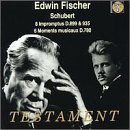| All Artists: Schubert, Fischer Title: Schubert: Impromptus D 899 & 935; Moments musicaux, D 780 Members Wishing: 0 Total Copies: 0 Label: Testament Release Date: 5/12/1998 Album Type: Import Genre: Classical Styles: Historical Periods, Modern, 20th, & 21st Century Number of Discs: 1 SwapaCD Credits: 1 UPC: 749677114527 |
Search - Schubert, Fischer :: Schubert: Impromptus D 899 & 935; Moments musicaux, D 780
 | Schubert, Fischer Schubert: Impromptus D 899 & 935; Moments musicaux, D 780 Genre: Classical
Edwin Fischer's sense of flow and proportion is at its most effortless here, and his broader-than-usual pacing in the Impromptus pays expressive dividends. Too bad he plays the bowlderized G Major text for the G Flat Impro... more » |
Larger Image |
CD DetailsSynopsis
Amazon.com Edwin Fischer's sense of flow and proportion is at its most effortless here, and his broader-than-usual pacing in the Impromptus pays expressive dividends. Too bad he plays the bowlderized G Major text for the G Flat Impromptu. Testament's transfers for the Impropmptus are more realistic in timbre and quieter in background noise than the very fine ones from Pearl and APR. --Jed Distler Similar CDs
|
CD ReviewsUnequalled 04/03/2000 (5 out of 5 stars) "Fischer transforms the music; this is not a set of piano impromptus anymore, but a promenade into novel sensibilities. Generally, no one has seen through this music as deeply as Fischer; Brendel comes close, but seems to lack a touch of magic. It may be that the otherworldliness of this recording comes parlty from the slightly etheral sound, just as beauty in a black-and-white photograph may stem partly from the abstraction afforded by the medium. Regardless, the pianism is breathtaking. For instance, the transition into the middle section of Op.90 #4 is sheer magic; the middle section itself is as tearing as Brahms' fourth symphony in the hands of Furtwangler. Listen also to the phrasing and rythmicity of op.142 #3. The piano is a beautiful Steinway of the 30's. The recording, even though remarkable for the time (1938), lacks bass. But the musical experience is unique."
|

 Track Listings (14) - Disc #1
Track Listings (14) - Disc #1



